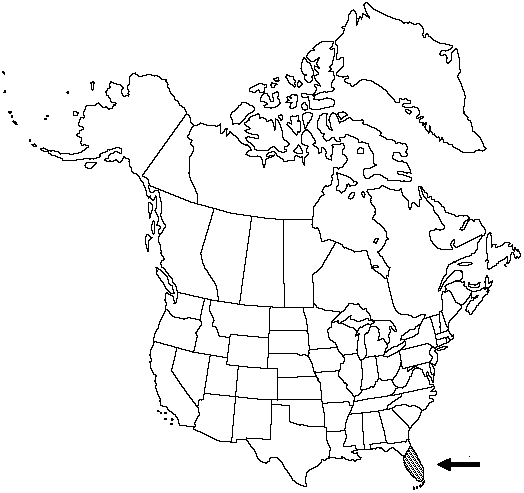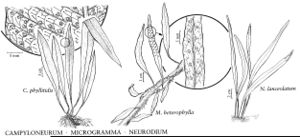Difference between revisions of "Campyloneurum phyllitidis"
Tent. Pterid. 190, plate 7, figs. 18–20. 1836.
Common names: Long strap fern
Illustrated
Basionym: Polypodium phyllitidis Linnaeus Sp. Pl. 2: 1083. 1753
Treatment appears in FNA Volume 2.
FNA>Volume Importer |
imported>Volume Importer |
||
| (One intermediate revision by the same user not shown) | |||
| Line 8: | Line 8: | ||
}} | }} | ||
|common_names=Long strap fern | |common_names=Long strap fern | ||
| + | |special_status={{Treatment/ID/Special_status | ||
| + | |code=F | ||
| + | |label=Illustrated | ||
| + | }} | ||
|basionyms={{Treatment/ID/Basionym | |basionyms={{Treatment/ID/Basionym | ||
|name=Polypodium phyllitidis | |name=Polypodium phyllitidis | ||
| Line 49: | Line 53: | ||
|publication title=Tent. Pterid. | |publication title=Tent. Pterid. | ||
|publication year=1836 | |publication year=1836 | ||
| − | |special status= | + | |special status=Illustrated |
| − | |source xml=https:// | + | |source xml=https://bitbucket.org/aafc-mbb/fna-data-curation/src/2e0870ddd59836b60bcf96646a41e87ea5a5943a/coarse_grained_fna_xml/V2/V2_648.xml |
|genus=Campyloneurum | |genus=Campyloneurum | ||
|species=Campyloneurum phyllitidis | |species=Campyloneurum phyllitidis | ||
Latest revision as of 20:24, 5 November 2020
Stems short-creeping, 4–10 mm diam. Leaves few to many, erect to arching. Petiole essentially absent to ca. 9 cm. Blade yellowish green, linear to linear-elliptic, 24–140 × 3–12 cm, leathery; base attenuate; margins entire to slightly undulate; apex acute (sometimes forked). Veins obvious, primary veins ± prominent, straight to slightly curved, areoles in 7–16(–18) series between costa and margin, with free included veinlets, a percurrent veinlet often dividing some areoles further. Sori in several rows on each side of costa. 2n = 148.
Habitat: Epiphytic in hammocks and swamps, sometimes on walls in limestone sinkholes where it is reduced in size, substrate circumneutral to subacid
Elevation: 0 m
Distribution

Fla., Mexico, West Indies, Central America, South America.
Discussion
Selected References
None.
Lower Taxa
None.
